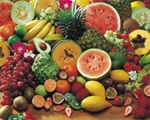A special restrictive diet may significantly reduce symptoms of attention-deficit hyperactivity disorder (ADHD) in young children.

ADHD is a common childhood disorder and children suffering from it have trouble paying attention, focusing and can be hyperactive. Parents have long suspected that sugary foods might be a culprit in inducing symptoms, but there's not a lot of evidence to support this theory. However, food additives and preservatives have recently been singled out as possibly having an effect on children's behaviour, though the evidence isn't yet conclusive.
Since some children have negative physical reactions to certain foods - such as eczema, asthma and gastrointestinal problems - that affect different organ systems, it has been suggested that foods may also affect the brain in a way that results in adverse behaviour. To test this theory, the researchers recruited 100 children from Belgium and the Netherlands. The children were between the ages of 4 and 8 years, and all had been diagnosed with ADHD. Most of the children were boys. The children were randomly assigned to one of two groups. One group was placed on the restrictive elimination diet, and the other group served as a control group and received advice on healthy eating.
The restrictive diet (containing no processed foods) began with a diet called the "few foods diet," which included just rice, meat, vegetables, pears and water. The researchers then complemented this diet with certain foods, such as potatoes, fruits and wheat. The restrictive diet lasted for five weeks.
During the next four weeks, children in the restricted diet group received two food challenge diets, in which certain foods were reintroduced into the diet. The researchers selected foods that were considered both low and high-IgG foods. IgG is an antibody made by the immune system that some alternative medicine practitioners believe is linked to food hypersensitivities; however, IgG testing is controversial among many mainstream physicians and even some naturopaths. Some complementary medicine practices recommend eliminating foods high in IgG.
Forty-one children completed the restrictive phase of the diet. Of those, 78 percent had a reduction in their ADHD symptoms, compared with no improvement in the controls. Nine children (22 percent) didn't respond to the diet. On an ADHD symptom scale that ranges from 0 to 72 points, with a higher score indicating more severe symptoms, the average reduction was 24 points.
Thirty children who had shown a response on the restrictive diet went on to the challenge test. Nineteen of those children had a relapse in symptoms on the challenge test. Moreover, it didn't appear to matter if the children were challenged with a low or high-IgG food.
The findings suggest that a strictly supervised diet is a valuable instrument to assess whether ADHD is induced by food. Dietary intervention should be considered in children with ADHD especially if parents notice that a child's behavior seems to get worse with certain foods.
DoctorNDTV is the one stop site for all your health needs providing the most credible health information, health news and tips with expert advice on healthy living, diet plans, informative videos etc. You can get the most relevant and accurate info you need about health problems like diabetes, cancer, pregnancy, HIV and AIDS, weight loss and many other lifestyle diseases. We have a panel of over 350 experts who help us develop content by giving their valuable inputs and bringing to us the latest in the world of healthcare.












